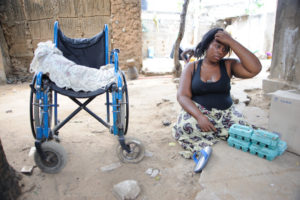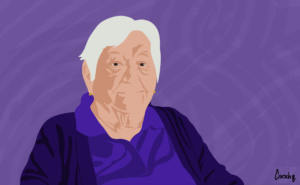In this blogpost by young Irish law graduates, David Whelan and Euan Lindsay, they chart the inspiring story of individual human rights defenders who refused to give up in the face of criminal prosecutions by the French state. At the end of March this year, the Cour de Cassation, building on a judgement of the Constitutional Council, finally acquitted the key defendant of all charges and refused to allow prosecutors to appeal. Could this crack in the walls of Fortress Europe be exploited in other parts of the bloc to bring the whole structure tumbling down?
The increase in migration into countries of the European Union (EU) in 2015, coupled with the EU’s failure to respect and honour asylum seekers right to claim international protection, which is enshrined in many international treaties, has led to situations in many parts of Europe in which people in need were not and still are not provided with sufficient lifesaving necessities. In response to this, humanitarian organisations as well as individual European citizens have tried to provide humanitarian assistance to asylum-seekers and migrants. Much like the NGOs working in this area, many of these individuals have been subjected to criminal proceedings, often accused of providing or facilitating illegal entry in an EU Member State.
Over the last 30 years the European Union has developed and implemented a distinctive set of policies and practices to confront what is widely described as ‘irregular migration’. These policies, which contravene the basic undertaking made by EU member states in relation to the protection of people seeking asylum, target the arrival of any persons who don’t have prior authorisation to enter the EU irrespective of their rights and entitlements. They also enable local and other authorities to bring criminal proceedings, not only, against the migrants’ themselves, but also against organisations and individuals that offer assistance to individuals in need of humanitarian aid. Between 2015 and 2018 alone, 158 individuals who provided support to people in need underwent prosecution in their national courts.. These intimidation practices employed by EU states undoubtedly deter others from providing migrants with basic lifesaving help. This includes rescue at sea; the death toll at EU borders continues to increase and adds to the misery and suffering of people attempting to escape war and persecution.
While prosecutions have occurred in many EU jurisdictions, the increase in migration from Italy to France via the Alps has resulted in the attempted prosecution of numerous French citizens for aiding migrants in this area. The prosecution of individuals who provide humanitarian aid, impromptu or otherwise, to those in need is in direct conflict with the humanitarian exception contained in the (EU) Facilitation Directive of 2002 and the protocols to the convention against transnational organized crime.
This well-established humanitarian exception stipulates that EU Member States must refrain from punishing people who facilitate irregular entry into or irregular stay within their territories if such entry or stay is merely the by-product of providing disinterested and non-incentivised humanitarian aid to migrants. Laws which define the duty to rescue or assist, and which criminalise the lack of provision of assistance in some cases, are present in many European Jurisdictions. Despite the above exception, the French public prosecutor’s office has continued in its attempts to prosecute individuals caring for people who cross the Italian-French border. Has the French Government embraced the Fortress Europe mentality by intentionally ignoring the above exception and the duty to provide assistance enshrined within Article 223-226 of the French Criminal Code?
The Case of Martine Landry
In 2017 alone 31,405 unaccompanied minors were recorded entering Europe via irregular migration routes. Among these were two Guinean children who travelled over the Alps to enter France and escape the deteriorating situation in a refugee camp in Italy.
On the 28th of July 2017, 73-year-old French pensioner Martine Landry awaited these two 15-year-old children on the French side of the French-Italian border. After their arrival in France, Landry took them to the nearby police station in Menton to register them as unaccompanied minors who, under the UN Convention on the Rights of the Child, could legally stay in France under the care of French child welfare services. While Landry maintained that she met the minors once they had entered France, French prosecutors charged her with the facilitation of irregular entry of non-nationals into the State under Article L622 of the Code of Entry and Stay of Aliens and Right of Asylum (CESEDA), leaving the pensioner to face a maximum penalty of five years in prison or a fine of €30,000 if found guilty. French prosecutors also accused Landry of forging documents which would enable the two Guinean youths to receive educational assistance in France.
In its Judgment on the 13th of July 2018, the Nice Criminal Court followed the Judgement of the French Constitutional Council on the 6th of July 2018 by distinguishing between facilitating the “entry” and facilitating the “stay” of migrants; it concluded that a defendant may only be held criminally liable for the former. The court further indicated that there was no material evidence to support the prosecutors claim that Landry had aided the two Guinean minors to enter France, and as such she was acquitted of all charges. In his judgement, the president of the court described Landry’s conduct as “A fraternal action with a humanitarian goal” and stressed that “she did not at any time seek to evade the law, but contrarily, showed nothing but respect for the law”.
Despite the clear line taken by the Constitutional Council and the Nice Criminal Court, Landry’s relief was short lived. On the 24th of July 2018 the Attorney General of Aix-en-Provence appealed the decision. It was only on the 7th of July 2020, a day before Landry’s appeal hearing and two years after her original acquittal by the Nice Criminal Court, that the Aix-en-Provence prosecutor’s office announced its withdrawal from the case. This suggests that the prosecutors were aware of their slim chances of success.
The Case of Cédric Herrou
Cédric Herrou, an olive farmer and local humanitarian activist in his neighbourhood in southern France, aided close to 250 migrants between 2015 and 2016 by picking them up on the side of the road, providing them with shelter and food at his farm and helping them on their forward journey.
On August 13th 2016, Herrou was transporting eight migrants close to the French-Italian border. French police followed Herrou back to his farm, pointed guns at his head and the head’s of the migrants and then took Herrou into custody. The migrants were then quietly hustled back to Italy without any consideration given to their right to seek asylum in France. 48 hours later, the Nice public prosecutor decided not to press charges after concluding that Herrou was acting for humanitarian purposes. Although Herrou was not formally charged on this occasion, his arrest is an example of the intimidation techniques employed by the French authorities to discourage other concerned citizens from showing solidarity with migrants.
Herrou’s dealings with the French criminal justice system were far from over. On October 20th 2016 he was arrested again after occupying a disused French railway station building that was housing 50 people who had just crossed into France. Like the majority of criminal cases brought against French human rights defenders, Herrou was charged with the facilitation of irregular entry of non-nationals into the State under Article L622 of the CESEDA and faced a maximum fine of €30,000 or five years in prison if found guilty. However, in an unusual turn of events the public prosecutor hailed Herrou’s actions as “noble” and asked the court to impose an eight-month suspended sentence on the defendant. On February 10th 2017, the Nice criminal court imposed a suspended fine of €3000 on Herrou, again demonstrating the French judiciary’s reluctance to criminalise humanitarian acts.
On appeal, the French public prosecutors attempted to make the argument that Herrou was aiding migrants to further his “activist endeavour” and that this could be interpreted as a form of “compensation”, therefore excluding him from the humanitarian exception contained in both French and EU law. If the prosecutor’s argument had been accepted, it would have meant that compensation would encompass both material and moral gain, thus excluding many others from any legal protection. However, Herrou and another French HRD who had an ongoing case against him for assisting migrants, Pierre-Alain Mannoni, brought a case to the French Constitutional Council arguing that Art. 622-4 of the CESEDA was unconstitutional. The landmark decision of this case, discussed in the conclusion of this piece, resulted in Herrou’s acquittal on May 13th 2020. The French authorities appealed his acquittal but after four years of judicial proceedings Herrou was finally and unequivocally acquitted of all charges on March 31st, 2021.
Cedric Herrou was the subject of many legal battles. He was the victim of police violence and suffered both emotional turmoil and financial hardship. While the judiciary again showed their reluctance to criminalise concerned French citizens, these prosecutions and appeals by the French authorities are a further illustration of policies of intimidation intended to discourage others from showing solidarity with migrants.
The Reaction of French Civil Society
Cases such as Landry’s, Herrou’s and Mannoni’s have brought European and French immigration and asylum policy and the concept of humanitarianism sharply into public focus. A 2017 report compiled by the Institute of Race Relations (IRR) noted how the downgrading of EU search and rescue measures in recent years, in favour of policies of deterrence and militarisation towards refugees, has created the need for civil society to intervene with humanitarian assistance. “Humanitarian Assistance” is also referenced in the EU facilitation directive to convey the questionable idea that member states have the option not to sanction acts of assistance to non-nationals.
Humanitarianism was a key legal argument in the constitutional case brought by Herrou and Mannoni. Here, the two applicants argued that Art. 622-4 of CESEDA was unconstitutional as it did not provide for an exemption “for any purely humanitarian act” providing aid to people in need. Many authors have written of the harmful and paradoxical nature of the criminalisation of individuals like Mannoni and Herrou. Solidarity and humanitarianism are values intrinsic to the French national identity, embodied in the slogan “liberte, egalite, fraternite”. Humanitarian acts are applauded and promoted when carried out within an international context, however when these same gestures are carried out in favour of individuals who are suspected migrants they are now being demonised and criminalised. The requirement to “save lives” and protect “vulnerable migrants” has been devalued and the core French value of “fraternité” is now in direct conflict with the concept of Fortress Europe enshrined in recent French and European immigration policies.
Conclusion
Cedric Herrou and Pierre Alain Mannoni’s constitutional court judgement is of critical importance. In this judgement the court sought to broaden the immunity from prosecution that was contained under Art. L622-624 of the CESEDA. The court found that the list of exceptions contained under the article was non-exhaustive and that individuals like Herrou and Mannoni could not be criminalised for providing “any other act of aid, not specified in the Act, for humanitarian purposes” to migrants in France. This landmark decision resulted in the amendment of the offending articles of the CESEDA. As the amended law currently stands, individuals who facilitate the irregular stay of migrants in France or who aid them in their movement within the State cannot be held criminally liable should such “disinterested” aid be given for a “purely humanitarian purpose”. However, individuals who facilitate the irregular entry of migrants into France still face up to 5 years in prison or a maximum fine of €30,000 if found guilty, regardless of the humanitarian nature of their actions.
While this decision of the French Constitutional Council ultimately led to Herrou’s acquittal in the Lyon Court of appeal on May 13th, 2020, French authorities appealed this decision on May 22nd, 2020, leading to further legal proceedings and uncertainty. It is extremely rare for the public prosecutor to appeal such a decision, especially after the decision was made after referral to the Constitutional Council. Similarly uncommon was the refusal of the Cour de Cassation (Court of Appeal) to permit the prosecutor’s appeal after extensive examination of its admissibility and accompanying procedural documents revealed that there was no likely chance of its success. While Cédric Herrou was finally and indisputably acquitted of all charges on the 31st of March 2021, the most recent attempted appeal is yet another example of the French state’s apparent determination to harass, intimidate and criminalise French activists at every turn. In refusing to admit the prosecutors’ appeal the French Judiciary has again demonstrated its reluctance to criminalise individuals for crimes of solidarity. However, citizens who assist asylum seekers and migrants will continue to be harassed until the French authorities stop bringing legal proceedings against them.
Notwithstanding the French Judiciary’s reluctance to criminalise humanitarian acts, the actions of the French authorities in these cases indicate that, like many of their EU counterparts, they have embraced the Fortress Europe mentality. The decision of 31 March 2021 of the Appeals Court, which has been widely welcomed by French civil society, clearly demonstrates the potential role that judicial activism could play in reducing the number of criminal cases brought against individuals like Landry, Herrou and Mannoni. Moreover, this judgement also provides a fascinating prospect to observe the contest between political imperatives and judicial principles which could play out across many European countries over the coming years. The reaction of the French prosecuting authorities to this decision and its effect in France, and indeed in other EU countries, is eagerly awaited. Could it be that persistent judicial activism across Europe could bring these cruel prosecutions to an end?
About the Authors
David Whelan is a Masters of Common Law graduate from University College Dublin who has an interest in Migration Law, Human Rights Law and Asylum Law. He writes about the inhumanity faced by individuals made criminally liable for providing aid to migrants and asylum seekers.
Euan Lindsay is a Bachelor of Common Law with Politics Graduate from University College Dublin. His research interests include Human Rights Law, Refugee Rights and Middle Eastern politics.
The views expressed in this opinion piece do not necessarily reflect those of United Against Inhumanity.











